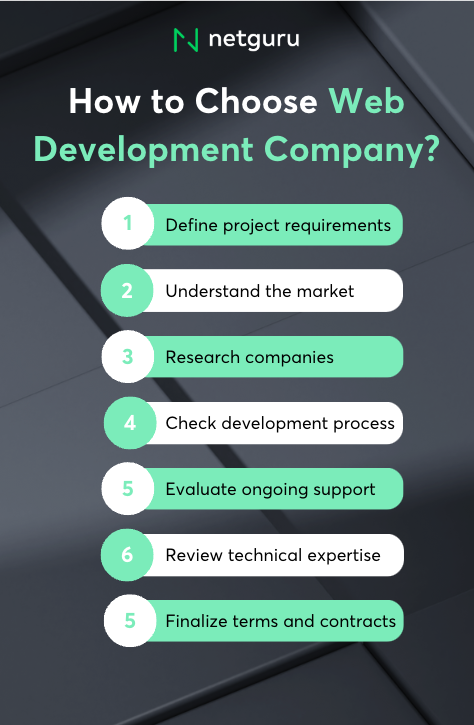How to Choose the Best Web Development Company?

Contents
Choosing the right web development partner for your business often isn’t easy.
Your website is a critical asset that represents your brand, drives engagement, and fuels growth. Selecting the right web development company is crucial to ensuring that your online presence aligns with your business goals and meets the expectations of your target audience.
This guide will help you navigate the process of choosing the best web development partner for your needs.
Key takeaways
- Clearly define your project requirements before searching for a web development company to avoid misunderstandings and delays.
- Evaluate potential agencies by researching their portfolios, client reviews, and technical expertise to find the best match for your project.
- Ensure ongoing support and maintenance, and consider cultural fit to foster a successful long-term partnership with the chosen web development company.
8 tips to find right web development company
1. Define your project requirements
The first step in choosing a web development company is to clearly define your project requirements. Without a well-defined project scope, you risk facing misunderstandings, delays, and cost overruns.
- Identify your objectives: Determine the main purpose of your website. Whether it's to sell products, generate leads, or provide information, having a clear goal will guide the development process.
- List key features: Decide on the functionalities your website needs, such as e-commerce capabilities, content management systems (CMS), or integration with third-party services.
- Web design and brand identity: Clarify whether your development partner will handle web design or if you’ll provide design assets. Ensure the design aligns with your brand identity for a cohesive online presence.
- Set a budget: Establish a realistic budget based on the complexity of your project. Be transparent about your budget with potential development partners to ensure alignment.
- Consider future growth: Think about the scalability of your website. Will you need to add features or accommodate more users in the future? Ensure your web development company can support your long-term vision.
In many cases, it’s a good idea to start by building a Minimum Viable Product (MVP). An MVP is the smallest version of your app that can be tested by the users. This approach helps validate your idea, control costs, and refine your product based on market response.
For larger projects, ensure your development partner offers scoping sessions or design sprints to refine the project scope, align expectations, and set a clear development roadmap.
2. Understand the market and your audience
A deep understanding of your market and audience is crucial before you begin working with a web development company. You need to know what your users want, how they will interact with your website, and what features will engage them the most.
- Know your market: Research industry trends, user behavior, and competitors. This will provide you with the insights needed to guide your web development agency in creating a product that meets market demands.
- Audience insights: Gather data on your target audience, including their preferences, behaviors, and needs. This will influence your website’s design and functionality.
Additionally, it's important that your web development team has experience in your industry or research skills to understand your market. They should act as your partner and advisor, bringing valuable know-how to help you build an exceptional product. A good development company will not only execute tasks but also offer strategic advice, helping you align your business goals with market demands.
3. Research and evaluate potential web development companies
With your project requirements and market understanding in hand, it's time to research and evaluate potential web development agencies. Look for firms with a proven track record and the right expertise to bring your vision to life.
- Evaluate portfolios: Review the portfolios of potential companies to see if they have experience with projects similar to yours. Look for diversity in their work and consistent quality.
- Check client reviews and references: Client testimonials and reviews on platforms like Clutch, Behance, or Dribbble provide insights into the company's reputation and customer satisfaction. Their strong online presence can also be a good indicator of credibility. Additionally, ask for references and case studies to see how they’ve delivered successful projects in the past.
- Assess technical expertise: Ensure the company has strong technical skills in both frontend and backend development. They should be proficient in frameworks and programming languages relevant to your project, such as React.js, Node.js, or WordPress. They should also be familiar with current trends including serverless computing, AI, blockchain, cloud computing, and Progressive Web Apps (PWA). Their expertise in search engine optimization (SEO) is also crucial for creating user-friendly websites that rank well on search engines.
- Look for a cultural fit: Your web development company will be a long-term partner, so ensure their values and working style align with yours. Consider their communication protocols and responsiveness to your inquiries to gauge how well they will work with your team.
- Review company history: Investigate how long the company has been in business and whether they are growing or stable. This can give you insight into their reliability and market presence.
4. Understand their development process
A structured and transparent development process is key to the success of your project. When evaluating web development companies, ask about their approach to project management and development.
- Project management tools: Inquire about the tools they use to manage projects, such as Jira or Trello, which can help keep the project on track and provide visibility into progress.
- Communication protocols: Effective communication is critical. Ensure that the company has a clear process for regular updates and feedback.
- Agile methodologies: Many top web development companies use Agile methodologies, which allow for iterative development and flexibility in responding to changes.
- Dedicated project management: Ensure you’ll have a dedicated team, including a Project Manager as your main point of contact. Some companies also offer a Customer Success Representative to ensure smooth communication. Clarify team roles, such as who will handle updates, content creation, and testing.
5. Evaluate post-launch support and maintenance
Your relationship with the web development company shouldn’t end when the website goes live. Post-launch support is essential for keeping your website secure, up-to-date, and performing well.
- Ongoing maintenance: Ask about the company’s maintenance services, including updates, bug fixes, and performance optimization.
- Security practices: Ensure they offer robust security measures, such as regular security audits, HTTPS implementation, and proactive monitoring.
- Support availability: Ensure they have a reliable support system, such as a ticketing system, to address issues promptly and efficiently.
6. Request a detailed proposal
Once you've narrowed down your list of potential web development companies, request detailed proposals from each. A comprehensive proposal should include:
- Project scope: A clear outline of the project’s goals, features, and functionalities.
- Timeline: A realistic timeline that includes key milestones and delivery dates.
- Budget breakdown: A transparent budget that details the cost of each phase of development, including design, development, testing, and post-launch support.
- Technical stack: A description of the technologies and frameworks that will be used in your project.
7. Evaluate the proposal and make your decision
Carefully review each proposal and compare them based on your project’s needs, budget, and timeline. Consider the following:
- Value over cost: While budget is important, don’t choose a company solely based on price. The quality of work and long-term support are crucial factors that can impact your business’s success.
- Communication and responsiveness: How well does the company communicate? Prompt and clear communication during the proposal stage is a good indicator of what to expect during the project.
- Company reputation: Consider the company’s track record, client retention rate, and any industry recognition or awards.
8. Finalize the contract
Before you sign on the dotted line, ensure that the contract covers all aspects of the project, including:
- Payment terms: Clear payment schedules tied to milestones.
- Ownership rights: Clarification on who owns the final product, including intellectual property rights.
- Termination clauses: Conditions under which either party can terminate the agreement.
- Support and maintenance: Details on post-launch support, including the scope of maintenance services and any associated costs.
Choosing the right company
Choosing a good web development company requires careful consideration of several factors, from defining your project requirements to understanding contract terms. Each step is crucial to ensuring a successful project outcome and a strong partnership. Prioritize value over cost, emphasize effective communication, and consider cultural fit to foster a seamless collaboration.
By following this comprehensive guide, you'll be well-equipped to select a web development partner who can bring your vision to life. This ensures that your website is not only visually appealing but also functional and aligned with your business goals.

Frequently asked questions
Why is it important to define project requirements before starting the search for a web development company?
Defining project requirements is crucial because it prevents misunderstandings and delays, ensuring the final product aligns with your expectations and goals. This clarity facilitates better communication and smooth project execution with the development company.
How can I research potential web development companies effectively?
To research potential web development companies effectively, use search engines, attend industry events, network in online communities, and compile your findings in a spreadsheet for easy comparison. This organized approach helps you identify the best partners for your project.
What should I look for when evaluating portfolios and case studies?
When evaluating portfolios and case studies, prioritize a diverse range of projects, consistent quality, and innovative problem-solving skills that align with your specific project needs. This approach will help you select the most suitable candidate for your requirements.
What should be included in a web development contract?
A web development contract should include payment schedules, timelines, service details, milestones, and ownership rights for deliverables. This comprehensive approach sets clear expectations and protects both parties, helping to avoid misunderstandings throughout the project.

